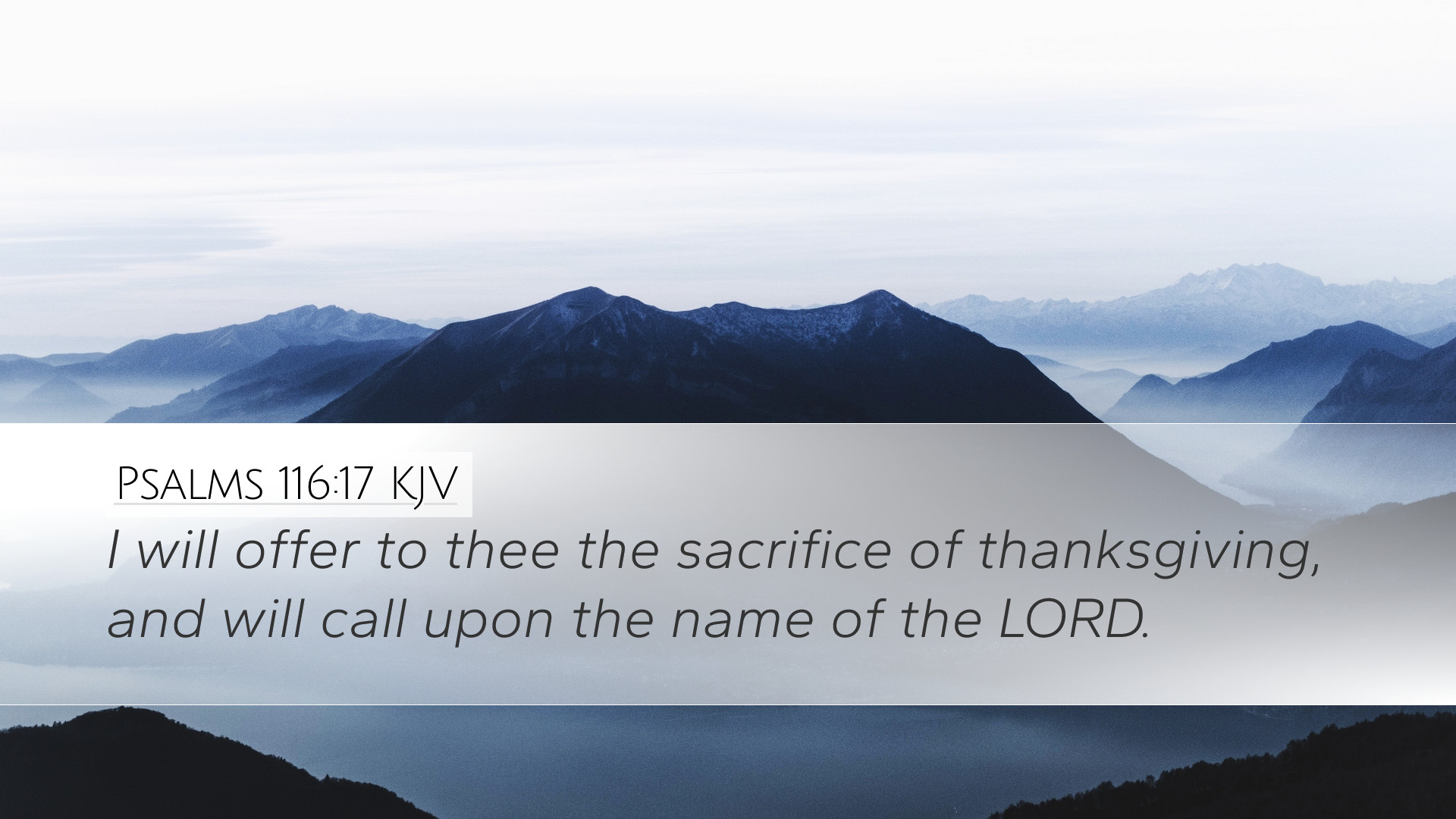Psalms 116:17 - Commentary Summary
Bible Verse: "I will offer to thee the sacrifice of thanksgiving, and will call upon the name of the LORD."
Introduction
The verse Psalms 116:17 encapsulates a profound expression of gratitude and devotion. This verse highlights the dual aspects of worship: the offering of a sacrifice and the invocation of God's name. In this commentary, insights from various public domain commentaries such as those by Matthew Henry, Albert Barnes, and Adam Clarke will be combined to provide a comprehensive analysis of the text.
Contextual Background
This psalm is traditionally attributed to David and is a personal reflection on God's deliverance from death and distress. The psalmist expresses his gratitude for salvation and recognizes the importance of thankful worship. The mention of sacrifices points to the established practices of ancient Israel, where offerings were integral to the religious life of the community.
Verse Analysis
1. "I will offer to thee the sacrifice of thanksgiving"
- Matthew Henry: Henry emphasizes that true thanksgiving goes beyond mere words; it constitutes a sacrifice. He explains that such sacrifices are pleasing to God when they stem from a heart truly grateful for His mercies.
- Albert Barnes: Barnes highlights the nature of thanksgiving as a sacrifice, asserting that it involves both acknowledgment of God's goodness and a commitment to give back to Him. He notes that this act of praise reflects a heart oriented toward gratitude.
- Adam Clarke: Clarke suggests that the "sacrifice of thanksgiving" is a central theme in the worship of Yahweh, emphasizing the Hebrew tradition of offerings, where thanksgiving was often accompanied by peace offerings. This coupling of sacrifice with gratitude is part of a covenant relationship with God.
2. "and will call upon the name of the LORD"
- Matthew Henry: Henry indicates that calling upon the name of the Lord signifies reliance and trust in God's sovereign name, which encapsulates His character and attributes. It is a public acknowledgment of His lordship and providence.
- Albert Barnes: Barnes relates the act of calling upon the Lord to prayer and supplication. He emphasizes that invoking God's name is associated with a personal relationship and a declaration of faith in His saving power.
- Adam Clarke: Clarke comments on the importance of God's name in the Hebrew culture, noting that it represents not just identity but also authority. By calling on His name, the psalmist asserts the lordship of Yahweh in both personal and communal contexts.
Thematic Insights
1. The Nature of Thanksgiving
This verse invites reflection on the essence of thanksgiving as both a personal and communal act of worship. Authors suggest that thanksgiving involves both recognition of personal deliverance and a commitment to share that gratitude within the faith community.
2. The Importance of Sacrifice
Commentators underscore that sacrifices in the Old Testament context were not just about material offerings but were deeply tied to one’s heart condition and relationship with God. Offering a sacrifice of thanksgiving is an act that stems from genuine gratitude and recognition of God’s work in one’s life.
3. Invocation of the Divine
The act of calling upon the name of the Lord is more than a ritual; it's a deliberate action that indicates reliance on God’s strength and presence. The verse encourages believers to maintain an active relationship with God characterized by reliance on Him in all circumstances.
Practical Applications
- For Pastors: This verse serves as a reminder to lead congregations in acts of thanksgiving that reflect both personal gratitude and communal worship. It also encourages the incorporation of testimonies of God’s deliverance in church services.
- For Students: Students of theology may explore the historical and cultural context of sacrifices in ancient Israel and how these inform contemporary worship practices. Reflecting on personal experiences of gratitude can deepen their understanding of God's ongoing work in their lives.
- For Theologians: The verse presents an opportunity to analyze the relationship between worship and sacrifice, and how this has evolved in a New Testament context. Engaging with this psalm can provide insights into themes of thanksgiving throughout Scripture.
- For Scholars: Scholars may examine the intertextual connections of gratitude expressed in the Psalms and other biblical texts, drawing parallels between themes of thanksgiving and covenant faithfulness.
Conclusion
Psalms 116:17 encapsulates the essence of a life marked by gratitude toward God. The blend of offering a sacrifice and calling on the Lord reflects a holistic understanding of worship that transcends mere ritual. May this verse inspire deeper reflections on the nature of worship and continual expressions of thanksgiving in our lives as we acknowledge God's unfailing mercies.


